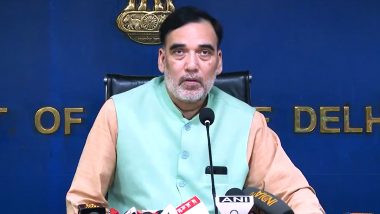Over 60 countries have pledged to slash cooling-related emissions at key UN climate talks, amid record temperatures this year.More than 60 countries have signed up to an agreement to slash cooling-related emissions from energy-guzzling air-conditioners and refrigerators.
Also Read | Entertainment News | This is What Manoj Bajpayee Has to Say About ‘Joram’.
The "Global Cooling Pledge" launched at the COP28 climate conference in Dubai calls for countries to reduce cooling sector emissions by at least 68% by 2050 compared to 2022 levels.
Also Read | World News | Prince Harry Challenges the Decision to Strip Him of Security in Britain After He Moved to US.
Cooling now makes up around a fifth of energy consumption, and as heat waves become more intense due to climate change, demand for air-conditioners and other cooling devices is set to soar.
Emissions from the sector are expected to surge to between 4.4 billion and 6.1 billion metric tons of CO2 equivalent by 2050, according to a report published on Tuesday by the United Nations Environment Programme (UNEP) at the climate talks.
At the same time, people will need access to life-saving cooling as temperatures rise. A recent report from the Lancet medical journal estimated that heat stress deaths could quadruple by the middle of the century.
Organizers hope at least 80 countries will sign up to the cooling pledge.
"The cooling sector must grow to protect everyone from rising temperatures," said UNEP Executive Director Inger Andersen on the launch of the cooling report. "But this growth must not come at the cost of the energy transition and more intense climate impacts."
Vulnerable countries lack cooling access
More than a billion people, largely living in Africa and Asia, lack access to cooling services, putting lives at risk from extreme heat. Women are disproportionately affected. Nearly a third of the world's population is exposed to deadly heat waves more than 20 days a year.
Lack of access to refrigeration reduces farmers' incomes, drives food loss and waste, and also blocks access to vaccines and medicine that need to be placed in cold storage.
"This access is especially important for the most vulnerable communities, who have often contributed the least to climate change but are the most exposed to its impacts," said COP28 President Sultan al-Jaber in a statement.
How to meet cooling demands while cutting emissions
The UNEP report outlines various measures to slash emissions from the sector, including boosting the efficiency of cooling technologies and phasing down the use of planet-heating refrigerants called hydrofluorocarbons (HFCs). Countries also need to boost passive cooling solutions in building and urban design.
Such measures could reduce emissions from "business-as-usual cooling" by more than 60% — or around 3.8 billion tons of CO2 — by 2050. It would also reduce electricity bills, save energy and allow an extra 3.5 billion people to benefit from refrigerators, air conditioners or passive cooling by mid-century, according to the report.
Rapidly decarbonizing power grids would help reduce cooling sector emissions by up to 96%.
"Countries and the cooling sector must act now to ensure low-carbon cooling growth. Fortunately, the solutions are available today," said UNEP's Andersen. "Getting energy efficient, sustainable cooling right offers an opportunity to cut global warming, improve the lives of hundreds of millions of people, and realize huge financial savings."
Edited by: Jennifer Collins
(The above story first appeared on LatestLY on Dec 05, 2023 10:20 PM IST. For more news and updates on politics, world, sports, entertainment and lifestyle, log on to our website latestly.com).













 Quickly
Quickly


















